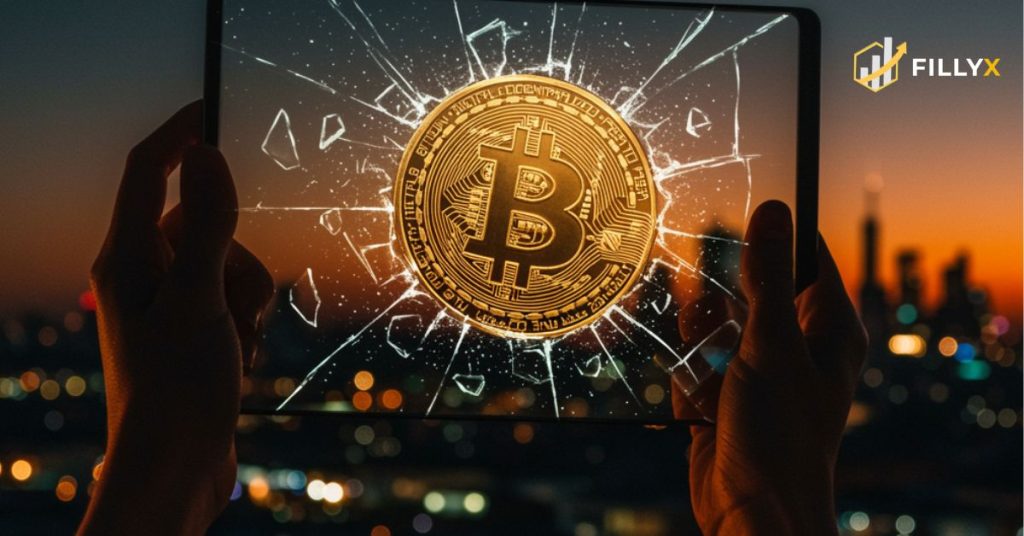How to Sell Cryptocurrency in Pakistan: A Complete Guide

Cryptocurrency trading has gained significant traction in Pakistan, despite the regulatory challenges posed by the State Bank of Pakistan (SBP) and other authorities. With the rise of digital assets like Bitcoin (BTC), Ethereum (ETH), and Tether (USDT), many Pakistanis are looking for secure and efficient ways to sell their cryptocurrencies. To sell cryptocurrency in Pakistan, users typically turn to trusted peer-to-peer (P2P) platforms, local crypto exchanges, or OTC (over-the-counter) services. Fillyx is a user-friendly and secure crypto exchange platform that simplifies the selling process. By creating an account, verifying identity, and choosing the desired token to sell, users can easily convert their crypto into PKR. Fillyx offers a reliable solution for individuals in Pakistan to sell their digital assets seamlessly, with strong security features and fast transaction processing. This comprehensive guide will walk you through the process of how to sell cryptocurrency in Pakistan using Fillyx, address legal considerations, and provide practical tips to ensure a smooth and secure transaction. Understanding the Crypto Landscape in Pakistan Before diving into the specifics of selling cryptocurrency, it’s essential to understand the regulatory environment in Pakistan. In 2018, the State Bank of Pakistan issued a circular prohibiting banks and financial institutions from facilitating cryptocurrency transactions. However, this ban does not explicitly prohibit individuals from owning or trading cryptocurrencies. Despite the restrictions, Pakistan ranks among the top countries for crypto adoption, driven by a young, tech-savvy population and a desire for financial autonomy. Platforms like Fillyx have emerged as a go-to choice for Pakistani traders, offering secure, anonymous, and efficient ways to sell cryptocurrencies without relying on traditional banking systems. Why Choose Fillyx to Sell Cryptocurrency? Fillyx is a leading cryptocurrency exchange platform designed to cater to users in Pakistan and beyond. Here’s why It stands out: User-Friendly Interface: Fillyx offers an intuitive platform, making it easy for beginners and experienced traders to navigate. P2P Trading: It supports peer-to-peer trading, allowing users to connect directly with buyers and sellers, bypassing traditional banking restrictions. Multiple Payment Methods: This platform supports local payment options like JazzCash, Easypaisa, and bank transfers, ensuring accessibility for Pakistani users. Security Features: With robust encryption, two-factor authentication (2FA), and escrow services, Fillyx prioritizes the safety of your funds and transactions. No KYC for Small Transactions: For users prioritizing privacy, It allows anonymous trading for smaller amounts, though larger transactions may require KYC verification. How to Sell Cryptocurrency in Pakistan Using Fillyx Selling cryptocurrency on Fillyx is a straightforward process. Follow these steps to convert your digital assets into Pakistani Rupees (PKR) or other fiat currencies: Step 1: Create a Fillyx Account To begin, visit the Fillyx website or download the Fillyx mobile app from the iOS or Android store. Sign up by providing a valid email address and creating a secure password. For enhanced security, enable two-factor authentication (2FA) during the setup process. While It allows anonymous trading for smaller transactions, you may need to complete KYC verification for larger trades to comply with international regulations. Step 2: Set Up a Crypto Wallet To sell cryptocurrency, you’ll need a wallet to store your digital assets. This platform provides a built-in wallet for convenience, but for optimal security, consider using a non-custodial wallet like Zengo or a hardware wallet like Ledger Nano S Plus. Transfer your cryptocurrency (e.g., Bitcoin, Ethereum, or USDT) to your Fillyx wallet by generating a deposit address from the “Wallet” section of the platform. Step 3: Navigate to the P2P Marketplace Fillyx’s P2P marketplace is the ideal place to sell your cryptocurrency. From the dashboard, select the “P2P Trading” option. Here, you can browse offers from buyers looking to purchase your cryptocurrency using local payment methods like JazzCash, Easypaisa, or bank transfers. You can also create your own sell order, specifying the amount of cryptocurrency you want to sell and your preferred payment method. Step 4: Choose a Buyer When selecting a buyer, prioritize those with verified accounts and high ratings to minimize the risk of scams. Fillyx’s service ensures that the buyer’s payment is held securely until you confirm the transfer of cryptocurrency. Review the buyer’s terms, including the exchange rate and payment method, before proceeding. Step 5: Initiate the Sale Once you’ve selected a buyer, confirm the amount of cryptocurrency you wish to sell and review the transaction details. Fillyx uses escrow to lock your crypto, providing protection for all involved. The buyer will then transfer the agreed-upon amount in PKR (or another currency) to your designated payment method. After receiving the payment, confirm the transaction on Fillyx to release the cryptocurrency to the buyer. Step 6: Withdraw Funds After the sale is complete, the PKR will be credited to your Fillyx account. You can withdraw these funds to your bank account, JazzCash, Easypaisa, or other supported payment methods. Ensure that your withdrawal method complies with local regulations and that you keep detailed records of all transactions for tax purposes. Legal and Tax Considerations While cryptocurrencies are not recognized as legal tender in Pakistan, they are considered property and are subject to capital gains tax (CGT). The Federal Board of Revenue (FBR) requires individuals to report profits from cryptocurrency transactions. Maintaining accurate records of your trades, including dates, amounts, and exchange rates, is crucial for tax compliance. Additionally, the Securities and Exchange Commission of Pakistan (SECP) has proposed frameworks for regulating digital assets, indicating a potential shift toward a more structured crypto environment. Stay informed about regulatory updates to ensure compliance when selling cryptocurrency. Tips for Safe and Successful Crypto Sales Use Reputable Platforms: Stick to trusted exchanges like Fillyx to avoid scams. Avoid direct transactions with unknown individuals outside of a secure platform. Prioritize Security: Enable 2FA, use strong passwords, and consider storing your cryptocurrency in a cold wallet when not trading. Check Buyer Ratings: On Fillyx’s P2P marketplace, choose buyers with high ratings and verified accounts to reduce the risk of fraud. Monitor Exchange Rates: It provides real-time market data to help you sell at the best possible rate. Avoid selling during extreme market volatility
Common Myths About Cryptocurrency Debunked

Cryptocurrency is a decentralized digital currency powered by blockchain technology. It has gained significant traction worldwide since Bitcoin’s introduction in 2009. In regions like South Asia, where digital financial systems are rapidly evolving, cryptocurrencies are becoming a popular investment and payment method. However, myths and misconceptions about cryptocurrencies persist, often driven by misinformation, regulatory uncertainty, or lack of awareness. These myths can discourage potential users from exploring this transformative technology. This article debunks the most common myths about cryptocurrency, tailored to the context of the local region, and highlights how platforms like Fillyx can simplify crypto engagement. Myth 1: Cryptocurrency Is Illegal Many people in Pakistan wrongly assume that cryptocurrency is against the law. This misconception stems from early regulatory uncertainty and mixed messages from authorities. In 2018, the State Bank of Pakistan (SBP) issued a circular advising financial institutions not to facilitate crypto transactions, leading many to assume that cryptocurrencies were banned outright. Globally, nations like the United States, Canada, and Japan have embraced cryptocurrencies with clear regulatory frameworks. In the local context, authorities are working to balance innovation with consumer protection. Platforms like Fillyx operate within these regulations, offering a compliant and secure environment for users to trade cryptocurrencies, making it easier for beginners to participate without legal concerns. Fact: Many countries have made cryptocurrencies legal, and governments are now creating rules to help them grow safely. Myth 2: Cryptocurrencies Are Only for Criminal Activities Another common myth is that cryptocurrencies are primarily used for illegal activities due to their perceived anonymity. While there have been instances of cryptocurrencies being used on the dark web, such cases represent a tiny fraction of total transactions. Blockchain technology, which powers cryptocurrencies, is pseudonymous, not anonymous. Transactions are recorded on a public ledger, and wallet addresses can often be traced to real-world identities through KYC protocols or forensic analysis. Law enforcement agencies have become adept at tracking illicit transactions, debunking the notion that cryptocurrencies are a haven for criminals. Fact: Most cryptocurrency transactions are legal, and because blockchain is transparent, it’s more difficult for criminals to hide their actions. Myth 3: Cryptocurrencies Have No Real Value Some people often argue that cryptocurrencies lack real value because they aren’t backed by physical assets like gold or government-issued money. However, value comes from supply, demand, and usefulness—not just physical backing. For example, Bitcoin has a limited supply of 21 million coins, which creates scarcity and helps drive its value. Ethereum powers decentralized applications and smart contracts, giving it practical utility in sectors like finance and gaming. Stable coins, such as Tether or True USD, are pegged to fiat currencies like the U.S. dollar, ensuring stability and real-world value. In the region, where remittances and cross-border payments are common, cryptocurrencies offer a faster and cheaper alternative to traditional banking. Major global companies, including Microsoft and PayPal, accept crypto payments, further validating their value. Cryptocurrencies also serve as a hedge against inflation, which is a concern in many emerging economies. Fact: Cryptocurrencies derive value from scarcity, utility, and market demand, much like traditional assets. Myth 4: Cryptocurrency Trading Is Too Complex Many believe that trading cryptocurrencies requires advanced technical knowledge or financial expertise. While blockchain technology can be intricate, trading itself is straightforward, especially with modern platforms. Opening an account on a crypto exchange is often as simple as signing up for an online service, requiring only basic personal information and verification. User-friendly Crypto Exchange platforms like Fillyx simplify the process further by offering intuitive interfaces, educational resources, and tools like automated trading. These platforms allow users to buy fractions of coins, making crypto accessible even for those with limited budgets. Real-time market data and tutorials help beginners in the region navigate the market with confidence, reducing the perceived complexity. Fact: Cryptocurrency trading is as easy as trading stocks, with platforms designed to cater to all skill levels. Myth 5: You’ve Missed the Opportunity to Invest in Cryptocurrency Some believe that the chance to invest in cryptocurrencies has passed, especially with Bitcoin’s price reaching tens of thousands of dollars. However, the crypto market is still in its early stages, with thousands of altcoins (alternative cryptocurrencies) offering diverse investment opportunities. Coins like Cardano, Solana, or Litecoin are more affordable than Bitcoin, allowing new investors to enter the market without significant capital. Moreover, users don’t need to buy a whole coin. Most exchanges support fractional trading, meaning even small investments can yield returns if the market grows. The crypto market’s volatility also creates opportunities for short-term trading, regardless of price levels. In the region, where digital adoption is accelerating, cryptocurrencies remain a viable investment option for both new and seasoned investors. Fact: The crypto market remains accessible, with affordable coins and fractional trading options for new investors. Myth 6: Cryptocurrencies Are Harmful to the Environment Cryptocurrency mining, particularly Bitcoin’s proof-of-work (PoW) mechanism. It has been criticized for its high energy consumption. Reports suggest Bitcoin mining consumes as much energy as some small countries. However, this narrative overlooks significant advancements in the crypto industry. Many cryptocurrencies, including Ethereum, have transitioned to proof-of-stake (PoS), a consensus mechanism that reduces energy consumption by over 99% compared to PoW. Additionally, miners are increasingly using renewable energy sources, such as solar or hydroelectric power, to minimize their environmental impact. In the region, where renewable energy projects are gaining traction, the crypto industry is aligning with sustainable practices. The industry is also exploring carbon-neutral initiatives to address environmental concerns. Fact: While some cryptocurrencies consume significant energy, the industry is adopting greener technologies and practices. Myth 7: Cryptocurrencies Are Completely Anonymous A common misconception is that cryptocurrency transactions are anonymous and untraceable. In reality, most blockchains are pseudonymous, meaning transactions are linked to wallet addresses visible on a public ledger. While these addresses don’t directly reveal a user’s identity, they can be traced through KYC protocols, IP tracking, or blockchain analytics, especially on regulated exchanges. For users seeking privacy, tools like VPNs or coin mixers exist, but they require technical expertise and don’t guarantee anonymity. Reputable exchanges enforce KYC and AML regulations, ensuring transparency. In the
